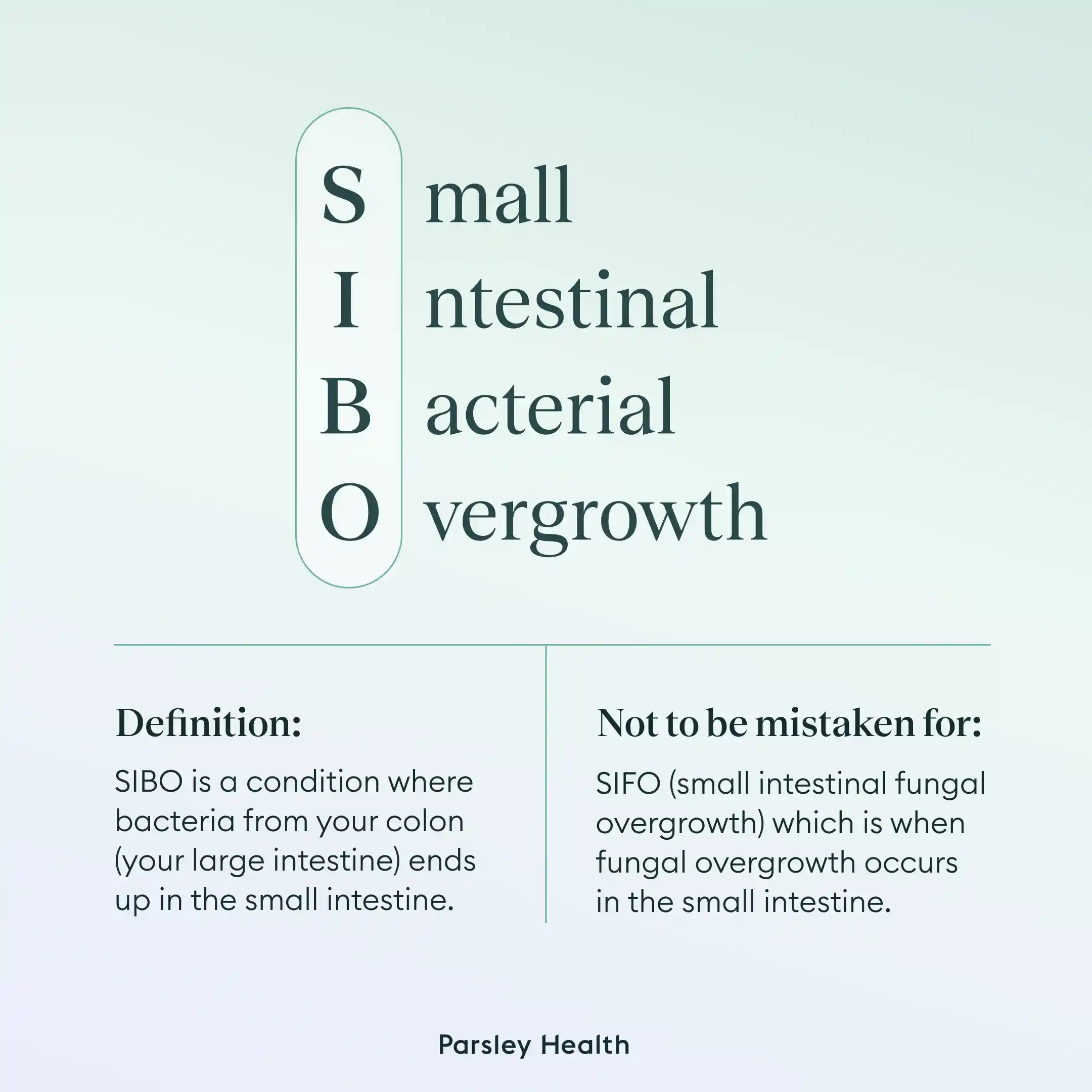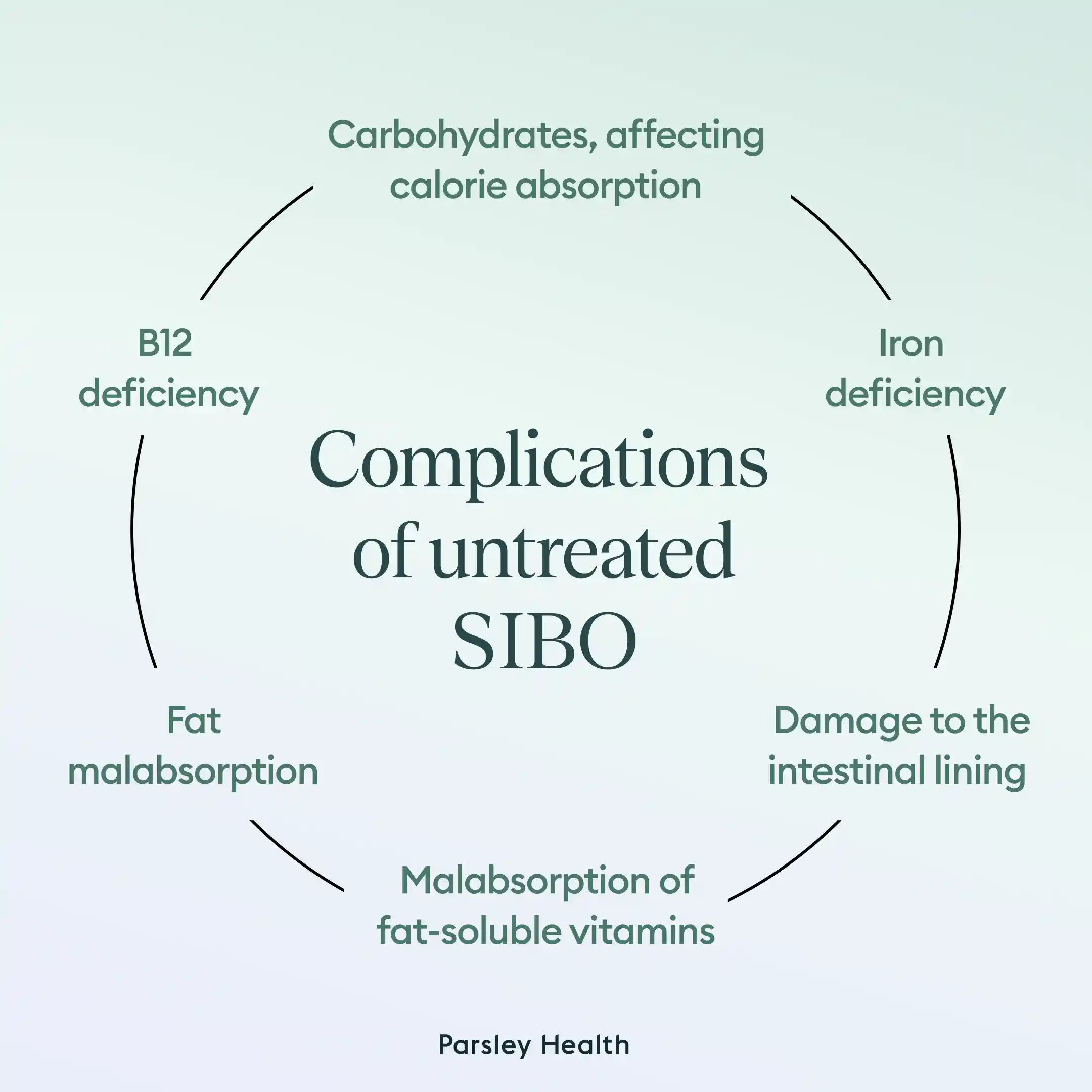Small intestinal bacterial overgrowth (SIBO) is a digestive condition where there is too much bacteria in your small intestine, triggering symptoms including painful bloating and stomach distention, gas, diarrhea, among others. SIBO can be addressed in several ways, including antibiotics, antimicrobials, and specialized diet protocols, though it can take several rounds of treatment to get relief. Functional medicine doctors will look for the root cause (there are many) and individualize your treatment with the goal of relieving your symptoms–and preventing flare-ups in the future.
The acronym SIBO stands for “small intestinal bacterial overgrowth,” and it’s a digestive condition that happens when bacteria grow out of control in your small intestine. This can cause quite a few problems, including inflammation and immune system dysregulation. Those, in turn, can give rise to common symptoms like bloating, abdominal pain, diarrhea and/or constipation.
This underrecognized—and often ignored—condition has been slowly gaining attention. The problem is, SIBO can go undiagnosed or be mistakenly diagnosed as something else. Here’s what you need to know about what SIBO is, its potential symptoms, and the best treatment options to help you feel better again.
What is SIBO?
SIBO is a condition where bacteria from your colon (your large intestine) ends up in the small intestine—yep, where it’s not supposed to be. “The small intestine is not supposed to be sterile, but it’s also not supposed to have much bacteria,” says Kaytee Hadley, RDN, IFMCP, a functional medical nutritionist who specializes in GI conditions including SIBO. That bacteria then ferments food that passes into your small intestine, creating gasses that are responsible for triggering your symptoms.

SIBO is a complex condition with multiple potential causes. Some of the causes of SIBO include:
- Aging
- Biochemical imbalances
- Certain medications like proton pump inhibitors (PPIs), opioids, and antibiotics. (Broad-spectrum antibiotics can kill both good and bad bacteria, causing an imbalance in the gut microbiota.)
- Digestive system dysfunction, which includes diseases like irritable bowel syndrome (IBS), inflammatory bowel disease (IBD), and celiac disease.
- Food poisoning
- Immune system factors like common variable immunodeficiency
- Impaired intestinal motility (which allows bacteria to multiply and migrate), including gastroparesis, scleroderma, and diabetes.
- Lifestyle factors, including stress, poor diet high in refined carbohydrates, and alcohol consumption.
- Low stomach acid, which reduces the body’s ability to moderate bacterial growth.
- Pancreatic insufficiency and chronic pancreatitis
- Prior gastrointestinal surgeries
- Structural abnormalities, such as small bowel diverticula, blind intestinal loops, adhesions and strictures, and ileocecal valve impairment. (These can create pockets where bacteria accumulate and disrupt normal flow.)
Not sure what your symptoms are really telling you?
The Parsley Symptom Index helps connect the dots across your whole body so you can understand patterns, not just isolated symptoms.
SIBO symptoms
Anyone who says ‘it’s just bloating’ or ‘bloating is totally normal’ doesn’t understand the agony that can come with feeling as if your belly is blown up like a balloon. That said, bloating isn’t the only symptom of SIBO.
Most common symptoms of SIBO:
- Abdominal distension
- Abdominal pain
- Bloating
- Diarrhea
- Gas
Other symptoms of SIBO can include:
- Belching
- Concentration problems
- Fatigue
- Fatty stool
- Flatulence
- Nausea
- Nutrient malabsorption
- Reflux
- Weight loss
Keep in mind, says Hadley, that every individual is unique in how SIBO presents, which is why proper identification and testing from a clinician is necessary.
Distinguishing SIBO from other conditions
One thing to know about SIBO symptoms is that they’re considered ‘nonspecific.’ That’s a term to describe symptoms that can show up in many other conditions. This is one reason why SIBO may be mistaken for something else. Another reason? It is often not tested for properly, says Hadley, which we’ll cover more in depth below.
The following conditions can have similar symptoms as SIBO, making it all the more important to get to the root cause of your digestive problems with proper testing:
- Celiac disease
- Chronic pancreatitis
- Functional diarrhea
- Functional dyspepsia (indigestion)
- Inflammatory bowel disease (IBD)
- Irritable bowel syndrome (IBS)
It’s entirely possible to have two of these conditions at once time, and there may be a real difficulty in distinguishing what condition is contributing to symptoms. For example, SIBO and IBS are often highly related. In fact, anywhere from 4 to 78% of people with IBS also had SIBO, compared to 1 to 40% of controls, according to a review in Gut and Liver. “I encourage everyone who has been diagnosed with IBS to get a SIBO test,” says Hadley.
Factors that trigger SIBO symptoms
Here’s what may prompt GI system distress when you have SIBO:
Eating: Unfortunately, when you have SIBO, it can feel as if anything you eat is a trigger for symptoms. “For many people, it doesn’t matter what they eat–they can bloat with water. It’s anything they put in their body,” says Hadley. Bloating and distention often get progressively more severe throughout the day.
A fiber-rich diet: Symptoms are often worse following fiber-rich meals, so efforts to “eat healthfully” can be met with discomfort, says Hadley.
High-FODMAP foods: Some people with SIBO may be sensitive to high-FODMAP foods, like garlic, apples, and onions, says Daniel Ricciardi, PharmD, a functional medicine practitioner who specializes in treating SIBO. (These foods are also often triggers for IBS. For a full list of high- and low-FODMAP foods, check out this resource from Monash University.)
Unchecked stress: Stress can make SIBO symptoms worse because it keeps your body in a sympathetic state (fight, flight, freeze) rather than a parasympathetic (rest-and digest) one that allows your GI system to function optimally, adds Hadley.
Short sleep: Sleep also impacts gut function and health, so lack of proper Zz’s can contribute to symptoms.
Healing stories from our members
Complications of untreated SIBO
SIBO is considered a malabsorption disorder, meaning it affects your body’s ability to digest and absorb certain nutrients. Bacteria present in the small intestine feed on certain nutrients, leading to potential deficiencies and GI tract damage:

Diagnosing SIBO
The preferred way clinicians diagnose SIBO is via a breath test, says Ricciardi. As bacteria ferment foods in your small intestine, they produce gasses like hydrogen and methane. A device that you blow into can measure the concentration of these gasses, indicating SIBO. Hadley adds that these tests can indicate what type of gas is present, clueing clinicians in on the type of bacteria present, allowing for more targeted treatments.
There are a variety of tests, including devices you can purchase and use at home. These can monitor your SIBO over time and also help you see how your body reacts to different foods. However, there are specific protocols that need to be followed for a diagnosis, says Hadley, and those include a prep diet, stopping promotility agents like laxatives or even coffee, and ensuring you’re using a device that tests for the appropriate gasses. So even though you may be able to test for SIBO at home, working with a clinician will help you get an accurate diagnosis, uncover the root causes and treat it correctly.
Re-testing throughout treatment can also help your clinician decide if they need to adjust their treatment strategy, adds Hadley.
Parsley Health offers physician-led functional medicine care, advanced lab programs, and flexible ways to get started, all designed to help you feel better over time.
Treatment options for SIBO
There are three primary ways of treating SIBO. You may need to use one or more than one to get rid of SIBO. Your clinician can help you determine which SIBO treatment option is best for you. The one they recommend depends on your health and preferences . The goal, says Hadley, is two-fold: Kill off the pathogenic bacteria in your small intestine and prevent relapse.
- Antibiotic treatment: Although antibiotics can trigger the condition, there are very specific antibiotics that kill pathogenic bacteria in the small intestine.
- Herbal antimicrobial treatment: Your prescriber can prescribe a combination of herbal antimicrobial agents, such as oregano, neem, berberine, allicin, among others.
- Elemental diet: This is an intense medical nutrition therapy formulated with nutrients that are broken down in their most elemental forms, plus vitamins and minerals. (For example, proteins are broken down into amino acids.) A liquid diet, this is taken for two weeks to starve bacteria of the nutrients it needs to survive. Although very effective, says Hadley, it should be taken in the supervision of a clinician to manage potential side effects like blood sugar swings. It often tastes terrible, but there are certain brands that are palatable, she adds.
Managing SIBO symptoms
SIBO treatment isn’t always that straightforward. Depending on the severity, you may need one or several rounds of treatment, and it can take about one to three months to start feeling symptom relief, says Ricciardi. “To feel better, we need two things: Get rid of the bacterial overgrowth and heal the gut,” he says. To improve the environment of your small intestine, he recommends the following things:
- Follow eating habits that promote gut motility. (When food moves along the digestive tract as it should, it’s less likely to sit, ferment and cause bacterial overgrowth). One of the best things you can do is to space out meals three to four hours apart, enough time for food to be swept out of your small intestine. In addition, chew food thoroughly.
- Activate your parasympathetic nervous system before eating by taking deep breaths before a meal. “This lets your body know it’s okay to sit and digest food,” he says.
- Consider supplements that support the motility of the GI tract, often referred to as prokinetics. Your clinician can help you choose the right one(s) for you.
- Consider supplements that support gut healing like glutamine.
- Consume foods that provide a source of probiotics and prebiotics. Supplements may also be recommended.
- Manage stress with activities like yoga, meditation, gratitude journal writing, exercise, spending time with loved ones, relaxing, and proper sleep.
Preventing SIBO
You’ve finally started to feel relief from near-constant bloating and trips to the bathroom for diarrhea and constipation. Now, you’ll do whatever you can to prevent SIBO from returning. “You can have a relapse of SIBO after treatment,” says Hadley. That’s why functional medicine clinicians focus so much on finding out the root cause. You’ll need to uncover why SIBO occurred in the first place and then address the underlying cause to the best of your ability.
That might be treating hypothyroidism, or working on restoring acid if you have low stomach acid, spacing out your meals, taking antibiotics only when needed, and avoiding food poisoning with healthy food hygiene habits. Not all these things can’t be fixed quickly–and many can’t be avoided–so if you experience a relapse, see a clinician immediately.
When to seek medical attention
If you have severe or persistent abdominal pain, bloating, or diarrhea, or a change in bowel habits, you should connect with a medical provider. Your symptoms can indicate SIBO, but there are so many diseases that can cause these digestive issues, including serious ones like colon cancer. Beyond worst-case scenarios, there is help for how you feel if you are diagnosed with SIBO or if you suspect it’s come back: “You don’t have to suffer. We can get symptoms under control, and if you have a flare-up, we can get right on it,” says Hadley.
Key takeaways
- SIBO is a bacterial imbalance in the gut where there is excess bacterial growth in the small intestine.
- The most common symptoms of SIBO include abdominal distension, abdominal pain, bloating, diarrhea, and gas.
- When left untreated, SIBO can lead to nutrient malabsorption and leaky gut.
- There are three potential treatments for SIBO: Antibiotics, herbal antimicrobials, and the elemental diet. One or more may need to be used.
- Management and prevention of SIBO include spacing meals three to four hours apart, chewing food thoroughly, temporarily limiting foods that trigger symptoms, managing stress, and getting adequate sleep.
Frequently Asked Questions (FAQs)
How do you get rid of SIBO?
SIBO is treated with antibiotics, antimicrobial herbal remedies, and a special liquid-only diet called the elemental diet. Treatment is determined depending on the degree of symptoms and severity of the condition.
What foods should I avoid with SIBO?
Some people find that foods that contain a lot of fiber or are high-FODMAP foods aggravate their symptoms during treatment. Beyond that, it can be helpful to avoid foods that contain a lot of added ingredients, focusing on mainly whole, fresh foods to promote gut health and reduce inflammation.
What does SIBO look like in stool?
SIBO can sometimes show up in stool as steatorrhea (excess fat in the stool), and some people may notice undigested parts of vegetables in their poop as well.
What is the life expectancy of someone with SIBO?
Someone with SIBO can enjoy a normal life expectancy. Most cases of SIBO can be treated, and most do not cause complications.
How do I know if I have SIBO?
SIBO is diagnosed with a breath test, which can often be done in-home. If you have common symptoms of SIBO like abdominal pain, bloating, distention (physical increase in size of the stomach), or diarrhea and/or constipation, ask your clinician if you should be evaluated for SIBO.
Who is prone to SIBO?
SIBO is associated with a host of diseases and conditions, including chronic pancreatitis, irritable bowel syndrome and inflammatory bowel disease. If you have gut motility problems due to anatomical problems or underlying disease, you may also be more likely to develop SIBO.
There is treatment for SIBO, but the first step is proper diagnosis and uncovering the root cause of why this gut imbalance developed in the first place. Reach out to a clinician at Parsley Health for a treatment plan and management approach that’s customized for you.









